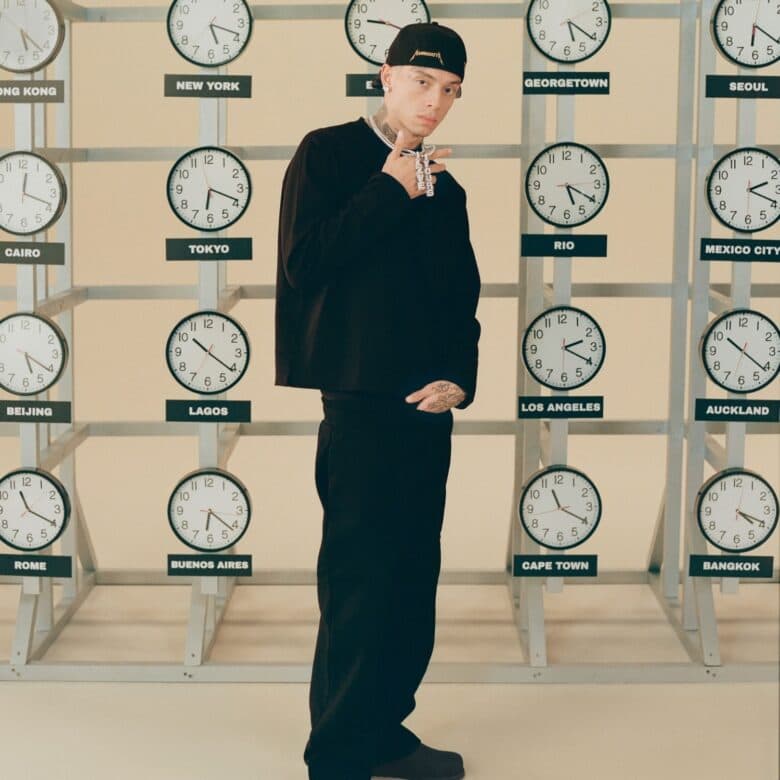Somebody’s Child are taking their time

“I think I chose music as the lesser of all evils,” Cian Godfrey tells me in our Kentish Town office, oat-milk latte in hand. “It was just something I was passionate about and I guess meeting a couple of people in school that wrote music gave me this validation that it wasn’t weird.” Now, with the sophomore album of Somebody’s Child having just dropped, you could say that going against the grain — and the countless hours spent learning piano from age five — have been worth it. Godfrey, though, is a self-prescribed “pessimist”. “I’m really bad at taking stock,” the band’s frontman admits. “This is why I have the other guys to balance me out.”
Nevertheless, Godfrey momentarily breaks his stoic demeanour to admit he’s “excited” about the release of When Youth Fades Away. It’s this same kind of juxtaposition of emotions that characterises the eleven-track record. In one respect, the album is very much an embodiment of Godfrey’s grappling with age — though, thankfully, turning thirty hasn’t been as horrendous as the Paris-born artist had feared. “I’ve actually really enjoyed it so far,” he says, “I wish I could tell myself six months ago just to calm down because I was freaking out.” The heaviness of the album’s theme, however, is offset by what the Londoner calls “danceability” where sound is concerned. “I think being able to laugh about these darker feelings is so important,” he reasons.

Whether it’s Godfrey’s pessimism or simply the wisdom of someone who’s now been around the metaphorical music block somewhat (the band are even playing a headline show at KOKO this October), the artist sees When Youth Fades Away as a “blank slate”. Through a combination of factors — including the Covid pandemic grinding the band’s progress to a halt — Godfrey admits that their first album was essentially “a mixtape of your best songs to put you in the shop window”. Its successor, then, is a more mature and honed-in take on where Somebody’s Child “needed to be creatively”. It’s also the product of an evolved approach to “what matters in life” — cutting the bullshit and realising that the journey just keeps on going.
How has your background influenced your approach to music?
I went to BIMM [in Dublin] and I met a tonne of cool people along the way. I think it’s more about the people you meet in college, rather than the actual curriculum or anything like that. There were some really successful bands in my year just serendipitously, and it felt like there was a bit of a ‘moment’ going on. I think it galvanised everyone to try a bit harder.
How was starting out post college?
You’re in a class with two hundred people and everyone thinks they’re gonna get there. And, you know, you have to look at the numbers. So, anyway, at the end of college, I wasn’t getting anywhere, so I gave myself nine months to try and have a crack at it, or else I was going to go back and study something else. But then I found my manager — my old manager, not my current manager — who started to get the ball rolling.
Where did the concept of ‘Somebody’s Child’ come from?
I was still learning who I wanted to be and Somebody’s Child was this pseudonym I could use to take me away from being in my own head about the kind of music I wanted to write. It was just me at the beginning, and then I put the band around it.

How was it moving away from Dublin?
At the beginning, I was just milking [Dublin] for all its creative worth — of which there isn’t too much left for me, unfortunately. There’s this weird, conflicting thing in Ireland where people don’t respect you until you have some activity going on outside of Ireland. So you have these Irish artists that you would never have heard of over here but are massive there, and you have other artists that are really big elsewhere, but everyone in Ireland doesn’t like them because they’re too big.
Irish music is really having a moment, though. Why do you think that is?
There’s been a bit of a romanticism of Ireland that’s hard to explain. I think we’re probably too close to the bone to understand it, but certainly there’s a change of opinion in the UK. I remember talking to someone and [they said] Ireland’s now like the cool younger brother of England.
Would you say being Irish is a big part of the band’s identity?
We never wanted to sound like we were a band that was, you know, from a specific territory. I think it is important to have certain themes, but, I don’t know, maybe from being brought up in France and stuff, I never felt indebted to one place or country. It’s always been, kind of, without borders.
What headspace were you in going in to making the album?
Honestly, we didn’t know where we were going with it until we went on Google Maps and actually looked at the house that we were recording it in, and then it all seemed to start making sense — at least in my head. I really struggle to work without, like, a deadline or being able to see myself in it.

Where did the theme of aging come from?
I’ve always [found] myself thinking back to when I was five or six and forming the human that I thought I would become. I think that’s had a large part to play in how the next part of my life unraveled. When I left college, I remember having panic attacks because my reality wasn’t matching my ambition — I wasn’t where I wanted to be at the age that I was, and age has always been such a marker in my head. When I came to this album, I didn’t want it to be about coming of age. I wanted it to be about the part of life you haven’t yet seen — beyond that age of twenty-six, twenty-seven that feels like it’s downhill from here, you know? So again, pessimism. Struggling with a sense of self. But I think, as you get older, your perspective changes on what really matters. Time does just continue and, you know, you experience different types of lives every couple of years. You feel like a different person. It doesn’t just end.
What’s your standout track on the album?
“Time Of My Life” is probably the most cathartic track I’ve ever written. You’re always searching for the song that makes you feel a certain way. And I don’t think I’ve ever had one of them. I’ve always just been chasing it. But I do remember when we wrote it, it just felt like a magical experience. I think you need to hold onto those feelings because that is the reason you do this at the end of the day.
Tell me about the video for “Porcelain”, where you’re dancing around in Waterloo station. How did you feel doing that?
Terrified. So terrified. I came up with the concept and I was like, I’d love to do a social experiment where you get someone to try to do a flash mob but nobody joins in. I was like, we’ll find someone to do that and then I just remember the other director, Adrian, was like, mm-hmm. I just saw it in his eyes and I thought, oh, I’m not gonna have to fucking do this. I was absolutely shitting myself but, to be honest, we’d done so much prep and there were so many people involved, I thought, I better just do a good job here. But it’s not meant to be a good dancing video. It’s just meant to be a show of self-expression.
Would you say that plays into the band’s ethos?
I’m definitely becoming more open to the idea of just, kind of, being myself because the opposite of that is exhausting. You’re told by everyone on the internet that you have to be funny and super out there, and you have to do all these things because other people are doing them. But the older and, hopefully, wiser I get, I just realise that a lot of it’s bullshit. So, in terms of ethos, I think [it’s about] just being able to be ourselves.
So, lastly, how do you feel about your album finally being out in the world?
I’m really excited. I hope people understand it and accept it. But if they don’t, that’s okay as well. I think this will be our greatest achievement, regardless of other people’s thoughts.
- WriterScarlett Coughlan
- Image CreditsJim Fuller




